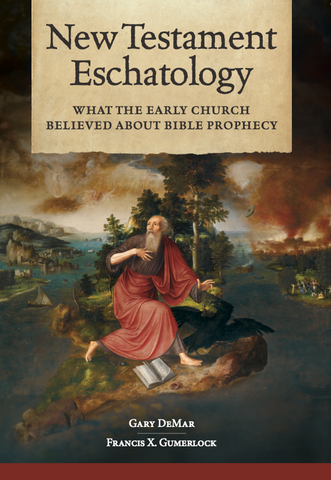How Theological Differences Should be Handled
Gary responds to a recent article by Ken Gentry that called Gary out for his views on eschatology.
The Nicene Creed and its anonymous cousin, the Apostles’ Creed, have been standards of orthodoxy for around 1700 years. A charge made by some Christians who ask questions about the creeds is that the creeds use “man’s language,” thus invalidating their authority. This is a harsh and mistaken claim since most of the statements in both creeds are taken directly from verses in the Bible, thus, they are God’s language for the most part: From God as the Creator of heaven and earth (Gen. 1:1) and one Lord Jesus Christ (1 Cor. 8:6) to Jesus being born of the Virgin Mary (Luke 1:27), having suffered under Pontius Pilate (John 18:24-40), and that He will come again, with glory, to judge both the living and the dead (Matt. 16:27-28; 25:31). These creedal statements are historical snapshots of events from the Apostolic era using biblical language. What they copied from the Bible must be interpreted by the Bible (Acts 17:11).
All creeds and Christians who recite them are bound by the text of Scripture. If we cannot agree on this basic point, then we cannot agree on much else. Yes, the creeds have consistency and history on their side. This is not in dispute. I believe Jesus came to judge the living and the dead, not because the creeds say it, but because the Bible says it. The creeds and the Bible should not be in conflict. The Bible is to govern the meaning of every word of the creeds. Jesus coming to judge the living and the dead was future for that Apostolic generation as the Bible makes clear. Like dispensationalists who appeal to the Old Testament to support their views by skipping over the fulfillment of prophetic passages either in the return of Israel from the exile and/or the New Covenant, those reading the creeds skip over the coming of Jesus that took place before “this [their] generation” passed away (Matt. 24:34).

It has been maintained by some modern writers that the early church was predominately premillennial and exclusively futuristic on Bible prophecy. While these claims have been made with certainty, there has always been a lack of clear historical documentation to support them. But since the futurist perspective has been promoted as an early church reality by so many for so long, few question it. New Testament Eschatology challenges this prevailing futurist view with a careful study of the historical record. The evidence shows that many early church writers understood the destruction of Jerusalem in AD 70 to be the end of the Old Covenant world.
Gary responds to a recent article by Ken Gentry that called Gary out for his views on eschatology. Gary’s point has consistently been that a real exchange needs to happen between different views regarding certain elements of Bible prophecy that some (like Ken Gentry) insist have been “settled.” The same hermeneutic that informs partial preterism is being used by others to defend consistent, or full, preterism.
Click here for today’s episode
Click here to browse all episodes of The Gary DeMar Podcast
American Vision’s mission is to Restore America to its Biblical Foundation—from Genesis to Revelation. American Vision (AV) has been at the heart of worldview study since 1978, providing resources to exhort Christian families and individuals to live by a Biblically based worldview. Visit www.AmericanVision.org for more information, content and resources
Source: https://americanvision.org/posts/how-theological-differences-should-be-handled/
Anyone can join.
Anyone can contribute.
Anyone can become informed about their world.
"United We Stand" Click Here To Create Your Personal Citizen Journalist Account Today, Be Sure To Invite Your Friends.
Before It’s News® is a community of individuals who report on what’s going on around them, from all around the world. Anyone can join. Anyone can contribute. Anyone can become informed about their world. "United We Stand" Click Here To Create Your Personal Citizen Journalist Account Today, Be Sure To Invite Your Friends.
LION'S MANE PRODUCT
Try Our Lion’s Mane WHOLE MIND Nootropic Blend 60 Capsules
Mushrooms are having a moment. One fabulous fungus in particular, lion’s mane, may help improve memory, depression and anxiety symptoms. They are also an excellent source of nutrients that show promise as a therapy for dementia, and other neurodegenerative diseases. If you’re living with anxiety or depression, you may be curious about all the therapy options out there — including the natural ones.Our Lion’s Mane WHOLE MIND Nootropic Blend has been formulated to utilize the potency of Lion’s mane but also include the benefits of four other Highly Beneficial Mushrooms. Synergistically, they work together to Build your health through improving cognitive function and immunity regardless of your age. Our Nootropic not only improves your Cognitive Function and Activates your Immune System, but it benefits growth of Essential Gut Flora, further enhancing your Vitality.
Our Formula includes: Lion’s Mane Mushrooms which Increase Brain Power through nerve growth, lessen anxiety, reduce depression, and improve concentration. Its an excellent adaptogen, promotes sleep and improves immunity. Shiitake Mushrooms which Fight cancer cells and infectious disease, boost the immune system, promotes brain function, and serves as a source of B vitamins. Maitake Mushrooms which regulate blood sugar levels of diabetics, reduce hypertension and boosts the immune system. Reishi Mushrooms which Fight inflammation, liver disease, fatigue, tumor growth and cancer. They Improve skin disorders and soothes digestive problems, stomach ulcers and leaky gut syndrome. Chaga Mushrooms which have anti-aging effects, boost immune function, improve stamina and athletic performance, even act as a natural aphrodisiac, fighting diabetes and improving liver function. Try Our Lion’s Mane WHOLE MIND Nootropic Blend 60 Capsules Today. Be 100% Satisfied or Receive a Full Money Back Guarantee. Order Yours Today by Following This Link.








The intellect depends on the mind as a basis of biblical truth; yet the believer depends on the Spirit to fill in the blanks.